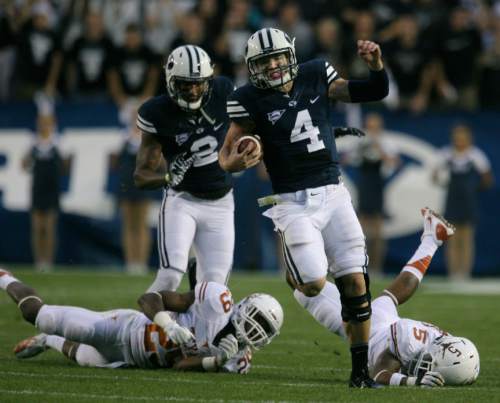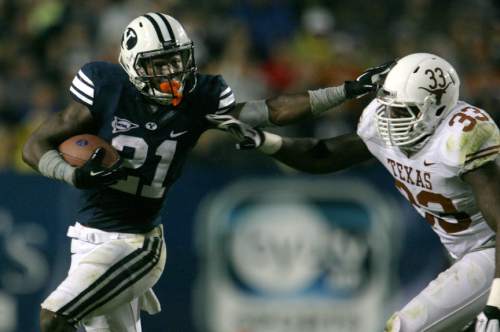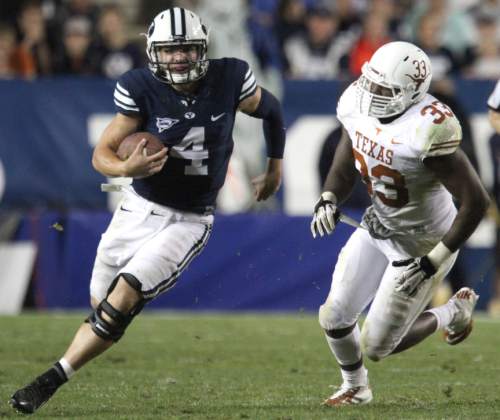This is an archived article that was published on sltrib.com in 2016, and information in the article may be outdated. It is provided only for personal research purposes and may not be reprinted.
Let's put away all the BS and get real here.
There is no question that of all the candidates trying to get into the Big 12, BYU has the top football program, and it's not close. That's based on and measured by the criteria the league itself put out as most significant. BYU has the best history, the best tradition, the best facilities, the biggest fan base, a decent-sized television market and the biggest care factor inside that market, the highest national profile, and the best chance for sustained success once included. It's better than half of the league already. It has accomplished in football what many of the other candidates are promising they will one day, if they are blessed by good fortune, if the planet rotates just right, if they find a leprechaun and pick a few four-leaf clovers, be capable of doing.
They all swear that last part is true. BYU has long ago proved it.
So, what's the hesitation?
A lot of people think — although they're guessing — it can be traced to a couple of basic things: geography and BYU's policy of no-Sunday play.
Those two problems could be solved if the Big 12 simply invited BYU as a football-only member.
Tom Holmoe has told the league that BYU, despite a preference for playing all sports in the conference, is open to singularly joining for football. And commissioner Bob Bowlsby has said the league is not wholly closed to that idea.
That way the softball team from, say, West Virginia wouldn't have to travel to Provo for a three-game weekend set that would have to be stacked into Friday and Saturday, with a doubleheader on one of those days, to avoid playing on Sunday. And special accommodation wouldn't have to be made for the Cougars in a small number of sports that hold their conference championships on Sunday.
If BYU was willing to take its football program independent, concurrently moving all of its other teams into the West Coast Conference in order to accommodate that football-centric move, it certainly would be willing to keep those other sports in the WCC to advance that same football interest in a P-5 league. Just like Holmoe said.
Still, something seems a bit incongruent and untidy about that option.
If you're in a conference, shouldn't you be all in? That's what every other school in the Big 12 is. They are Big 12 institutions. That's their identity. That's who they are and what they are. Said the poet, or maybe it was Aunt Donna, "Don't do anything halfway, unless you're willing to be half-happy." It was Bruce Lee who said: "I don't want to do anything halfway. It has to be perfect."
Football-only membership for BYU would not be perfect.
It would once again relegate and substantiate the rest of the Cougars' successful sports endeavors to and as second-class.
It is, though, better than no membership at all.
And since football is the sport that gathers in the most money, especially TV money — and let's say it straight, money is what drives most of these decisions — football-only membership, even if the payouts were gradual, would be greatly beneficial to BYU's athletic department, even with its other teams stuck in the WCC.
It would also be more convenient for everybody — for the other-sport teams at schools already in the Big 12 who wouldn't be forced to travel west, and for BYU's teams, too. It's easy to forget that most of these athletes are … well, students, students who have other, more important things with which to concern themselves. Football can fly in and out for a game a little easier than some sports. And, again, there are those rich financial rewards for doing so. Swimming and track and baseball? Not so much.
If BYU football were brought into the Big 12, and all the other teams were left out, the guy and the program to feel for the most would be Dave Rose and men's basketball. Cougars B-ball deserves better than being kept to playing in the high school gyms in the West Coast. Yeah, Gonzaga is there, and BYU has hardly dominated the smaller league, but playing in the WCC hasn't helped grow a proud basketball tradition that belongs in a conference like the Big 12.
On the other hand, many BYU teams are worthy of playing in the bigger league, and, in that league, they would likely develop and thrive. If, in this case, they remain junked out west, it will underscore again where BYU's athletic priorities are: In preserving and serving the tradition LaVell built.
Maybe full membership can be worked out, and it probably could be. Maybe with college teams jetting around from venue to venue, from region to region, competitive life on the road would be manageable and tolerable. Maybe the Sunday-play thing isn't as big of a deal as some believe it to be. Maybe regular-season games and matches, and perhaps even championships, can be shifted in the few sports affected.
But if they can't, BYU football is too important to the school and to the financial stability of all sports to inhibit it via any sense of synchronicity or equality.
Turns out, the poet and Aunt Donna and Bruce Lee were wrong. Sometimes doing things halfway is fine enough, happy enough, perfect enough. Sometimes it's a whole lot better than nothing at all.
GORDON MONSON hosts "The Big Show" with Spence Checketts weekdays from 3-7 p.m. on 97.5 FM and 1280 AM The Zone. Twitter: @GordonMonson. —
Glass half-full?
The pros and cons of BYU joining the Big 12 as a football-only member:
Pros
• Easier travel, fewer expenses for BYU's other teams, which could stay in the WCC.
• Big 12 teams wouldn't have to send their other teams to Provo.
• Takes pressure off the no-Sunday-play issue, a BYU restriction that could inconvenience other conference members in a few sports.
• Allows BYU to reap the financial and exposure benefits of Big 12 football.
Cons
• Disjointed and unequal status for BYU overall, and in all sports other than football — especially men's basketball.
• Lesser competition for teams in those sports.
• Diminished television exposure for those teams.
• Recruiting challenges; missing out on athletes in other sports who might come to BYU if it played in the Big 12.







